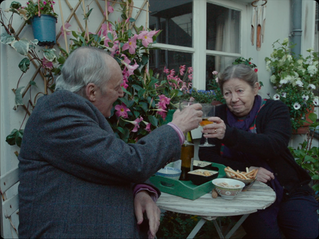The Souvenir
- Olivia E. Taylor
- May 23, 2021
- 3 min read
Joanna Hogg, 2018

There was nothing at all, and I was walking in the ways of the dead.
Writer and director Joanna Hogg based the semiautobiographical The Souvenir on her own experiences and relationships during film school. Leaning towards a bildungsroman, in delicate terms, the narrative follows naive and innocent Julie (Honor Swinton Byrne) and her attempt to balance the roles of a film student, friend, daughter, whilst maintaining a relationship with an emotionally abusive partner. Hogg’s inextricable attachment to her picture leaves the narrative’s memory processes muddied. It often falls into self-reflexive territories as its metaphysical properties slip into each other. Picture a lineup of Russian dolls that one by one begin to fade, until there is nothing at all.
At a film set, Julie stands right of frame. The film crew parallels her position. The background is smothered in darkness similar to Julie’s apparel; her body blends into the space to illustrate her disconnection from reality; her sullen face glows beneath the twilight. The camera achingly advances inward and drifts toward her. This effortless motion feels as though time, or Julie, has stopped altogether—it shifts without warning.
Here, Julie is enchanted by an actress who recites a poem.
When I am dead, my dearest,
Sing no sad songs for me;
The poem is Christina Rossetti’s When I am dead, my dearest, published in 1848. Historically, the two stanza poem has long been recited at funerals, wakes, and celebrations of life. It directs those grieving to ‘sing no sad songs’ and to ‘be the green grass above’, urging its listener to feel only goodness, to alleviate the sadness of someone’s passing. And yet, the poem’s delivery here becomes a helpless gesture. Julie stands expressionless; Rossetti’s words pull her into a deeper sorrow. The viewer feels betrayed by this resolution as much as Julie, absented of long-awaited relief. Chiefly, Rossetti’s poem can be compared to Julie’s poem during the film’s interval:
And so restless, through the slow hours of night.
I lost any consciousness of will, and then nothing at all.
As the scene slowly draws inward, the actress’s diegetic monologue continues. The camera sedately pans right and passes the film crew. It seeks out Julie, though she remains frozen still. This simple camera movement reveals Julie’s displacement; she watches her peers move onward whilst she becomes an outlander.
Julie’s head turns to face the camera, her glossy eyes stare intently at the viewer. In breaking the fourth wall, connection is supplanted by alienation. Perhaps Julie is gazing at Hogg, or vice versa, transcending time and space; artist and subject. Hogg captures Julie at her most vulnerable, and Julie openly obliges.
When the actress ends her recital, silence falls across the room. Though the silence originates not from the film set, but rather Julie’s empty interior world, to which the viewer (her confidant) and the camera (her diary) bear witness. There is nothing left to say. This attests to Julie’s isolation, as if the camera is all she has: not her boyfriend, her mother, or her peers, only a speculative audience. Perhaps this fourth wall break is a bid farewell. Figuratively and metaphorically, she bows her head—roses fall at her feet.
Cut to the film studio’s brutalist doors as they widen and expose an English landscape, the same landscape seen during Julie’s poem interval. This image extends the metaphor of a curtain fall, except swathes of red velvet take shape as large mechanical doors. A contrast between the elements, the manmade warehouse against the fields of England illustrates the film’s contiguity between peace and chaos. Steel doors open heavily to nature, evoking sensibilities of renewal and healing. Birds begin to sing against howling metallic friction; they lure the protagonist to advance into new spaces. And yet, the door doesn’t fully open, conveying Julie’s hesitation. She stares at what she could but does not yet have.
The possibility of this space is tempting. Calmly; peacefully, Julie steps out into the landscape, leaving the question of her progression out of the epilogue and into the unknown.









Comments